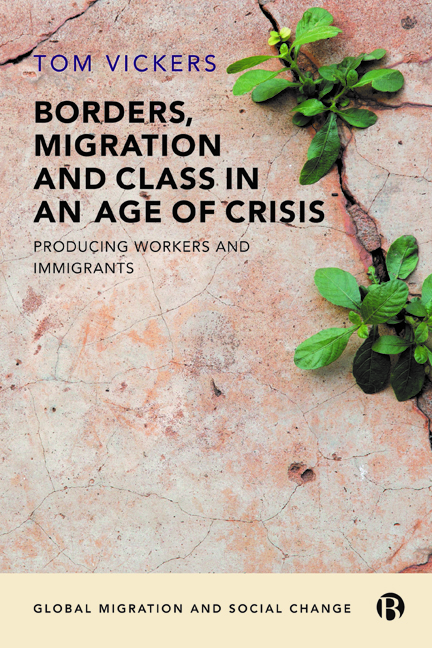Book contents
- Frontmatter
- Dedication
- Global Migration and Social Change
- Contents
- List of Figures and Tables
- Acknowledgements
- Series Preface
- 1 Introduction
- 2 Imperialism, Migration and Class in the 21st Century
- 3 Deconstructing Migrant Crises in Europe
- 4 Deconstructing Welfare Crises
- 5 Mobility Power and Labour Power in the Crisis of Imperialism
- 6 Deconstructing Migrant/Worker Categories in Britain
- 7 Conclusion
- Appendix: Methodology
- References
- Index
6 - Deconstructing Migrant/Worker Categories in Britain
Published online by Cambridge University Press: 30 April 2022
- Frontmatter
- Dedication
- Global Migration and Social Change
- Contents
- List of Figures and Tables
- Acknowledgements
- Series Preface
- 1 Introduction
- 2 Imperialism, Migration and Class in the 21st Century
- 3 Deconstructing Migrant Crises in Europe
- 4 Deconstructing Welfare Crises
- 5 Mobility Power and Labour Power in the Crisis of Imperialism
- 6 Deconstructing Migrant/Worker Categories in Britain
- 7 Conclusion
- Appendix: Methodology
- References
- Index
Summary
Introduction: ideological categories in an age of crisis
Hegemonic discourse supplements physical means of differentiation with ideological categories of workers divided along multiple lines. Racism facilitates capitalist exploitation by increasing pressure to accept lower wages, undermining solidarity from other sections of the working class and further reducing access to state welfare (Miles, 1986). Hegemonic cultural processes are therefore part of systems of material exploitation, and discursive challenges are a necessary part of struggles to transform them.
Oliveri (2012: 796–7) suggests that ‘In relation to human mobility … [neoliberal hegemony] produces a trend towards the radical commodification of migrants as pure labour-power: their rights to leave, to entry or to stay in a country depend preponderantly on their economic usefulness according to market rules’. This ideological trend has emerged as part of ruling-class responses to the capitalist crisis, intensifying labour discipline, and leads to dehumanisation that normalises state violence and discourages solidarity. Ideological figures such as ‘migrants’, ‘newcomers’, ‘Romanians’, ‘illegals’, ‘residents’ and ‘British workers’ play the role of ‘exemplary bodies’ (Rajaram and Grundy-Warr, 2007: xv; see also Philo et al, 2013), which mark out terms of belonging and non-belonging within the national territory. In doing so, they reveal important characteristics of wider social structures, with significance for systems of domination and exploitation that affect the entire working class, though differentially.
Chapter 6 examines discursive reflections and reinforcements of the class divisions discussed in previous chapters. This analysis is developed through a ‘close reading’ of three British television documentaries, together with academic literature which suggests that these documentaries are representative of wider trends. The chapter concludes by arguing for the need to shift the discursive focus from migrants to borders, and to question how both are constructed and connected to systems of exploitation and oppression.
Migrant/worker categories in three television documentaries
Documentaries often claim to present a direct, unmediated and therefore ‘authentic’ image of reality (Nichols, 2010). Santa Ana (2013: 202) argues that such claims are always false because the construction of a narrative inevitably involves choices about what to include and what to leave out, and the act of telling a story about ‘the facts’ necessarily transforms them. Documentary television is therefore not just representational, but ‘authorial’ in its presentation of a particular ‘vision’ of society (Corner, 1996: 14).
- Type
- Chapter
- Information
- Borders, Migration and Class in an Age of CrisisProducing Workers and Immigrants, pp. 169 - 184Publisher: Bristol University PressPrint publication year: 2019

